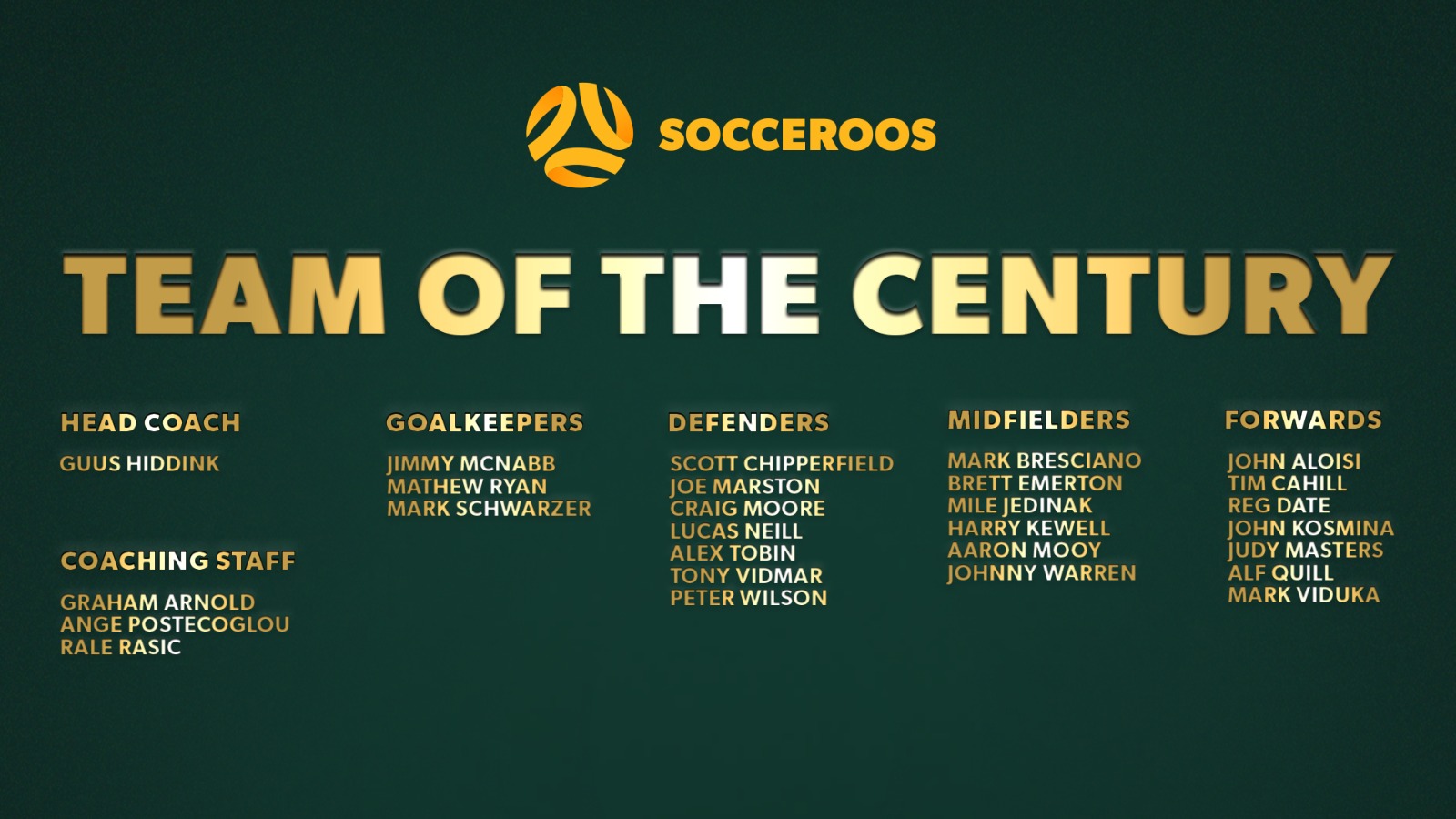The Subway Socceroos’ Team of the Century was announced before Australia’s friendly against New Zealand at Suncorp Stadium a week ago.
2022 coincides with 100 years since Australia’s first men’s ‘A’ international took place in Dunedin.
Ahead of the encounter in Brisbane, Football Australia confirmed the list of those selected and honoured, after over 110,000 individual player and coach selections were digitally submitted by supporters throughout August and September.
In addition to the 16 fan selections, seven players were nominated by Football Australia’s Panel of Historians.
Here is the list of coaches and players that made the Team of the Century.

READ MORE: Honourable Mentions: Team of the Century vote
Head Coach
Guus Hiddink
Guus Hiddink helped end Australia’s 32-year World Cup drought after beating Uruguay on penalties in 2005. In Australia’s second-ever World Cup appearance in 2006, he led the team to the Round of 16, getting out of a group containing Brazil, Japan and Croatia. The Dutch legend has previously been in charge of the the likes of the Netherlands, PSV Eindhoven, Chelsea, Real Madrid, Korea Republic and Valencia. Hiddink returned to the dugout alongside Graham Arnold for the recent friendly matches against New Zealand as part of the Centenary celebration.
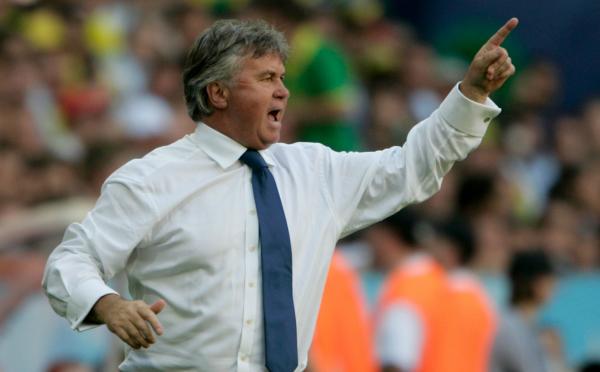
Coaching Staff
Graham Arnold
From 1984 to 1990, Arnold played 178 games and scored 67 goals with Sydney United. He was named 1986 NSL Player of the Year and top scorer with 17 goals. In the late 1980s, Arnold moved overseas to play in Belgium, Japan and Holland where he became prominent with Roda JC (Holland) as a leading striker. Arnold played for Australia in 56 ‘A’ internationals, scoring 19 goals. Between 2000 and 2010 Arnold worked in various coaching roles with the national team at various levels, though predominantly with the senior side as an assistant but also interim boss. In 2004, he was inducted in Football Australia’s Hall of Fame.
During his time as an A-League coach, he won the Coach of the Year on three occasions, winning a combined four Premierships and two Championships with Central Coast Mariners and Sydney FC. After the 2018 FIFA World Cup in Russia, Arnold took over as head coach of the Socceroos and U-23's. In January 2020 he guided the U-23's to the Tokyo Olympics, the Olyroos' first Olympic Games in 12 years. He later secured Australia’s place at the FIFA World Cup Qatar 2022™ following a dramatic penalty shootout win over Peru.
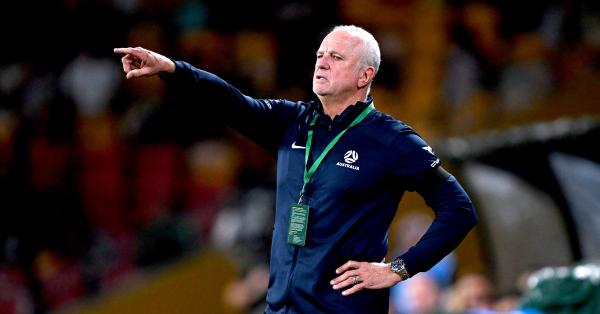
Ange Postecoglou
Ange Postecoglou was appointed Head Coach of the Subway Socceroos in 2013 and was at the helm until 2017, helping Australia qualify for the FIFA World Cup in 2018. Credited for bringing a number of young players into the team, Postecoglou was in charge of the team in 2014 in Brazil, six months later he guided Australia to the 2015 AFC Asian Cup following an extra-time win over Korea Republic. An offensive minded tactician, Postecoglou likes to employ an attacking brand of football, built on high intensity and is currently coaching Scottish powerhouse Celtic. He also achieved four caps for the Green and Gold as a player and previously coached Australia at youth level for seven years.
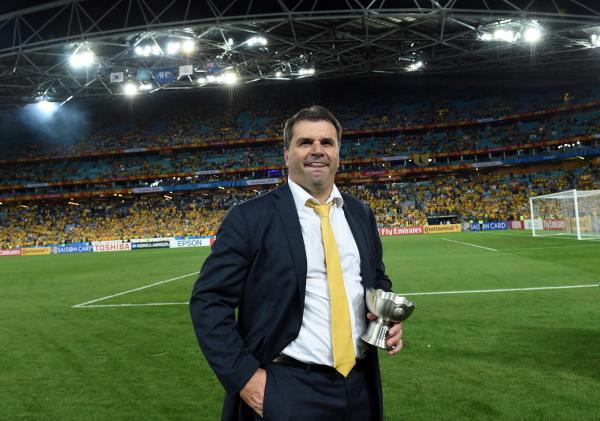
Rale Rasic
Rale Rasic was appointed national coach in August 1970, starting a run of success for the Socceroos that included a 12-match unbeaten streak in the 1972 world tour, an undefeated tour of Asia and a 2-2 draw with Pele’s Santos. Rasic took the team through the 1974 rounds to line up matches against West and East Germany and Chile, culminating in Australia’s first appearance in the World Cup Finals in Germany. In 2001 he was awarded the Australian Sports Medal and the Centenary Medal for "services to soccer", and in 2004 the Medal of the Order of Australia (OAM) for "service to soccer as a player, coach and administrator." In 1999 he was a 1999 inductee into the Football Australia Hall of Fame.
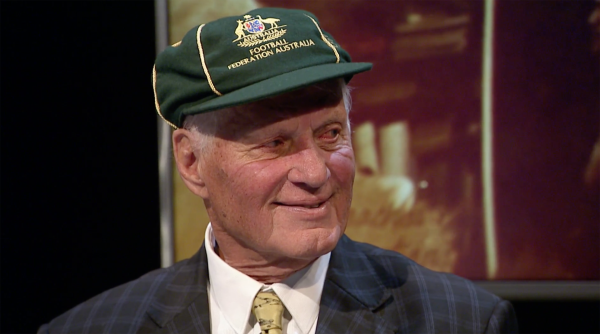
Goalkeepers
Jimmy McNabb
Jimmy McNabb started his football career as a fullback with Weston in Northern NSW until an injury to his right ankle turned him into an outstanding goalkeeper. Within two seasons he was selected for the Northern NSW representative team and played for Australia on 17 occasions. McNabb’s most notable effort occurred in July 1937 when he saved a penalty, enabling Australia to hold on and beat England 4-3. Australia took the series 2-1, a win that put Australia on the world football map. He was inducted into the Football Australia Hall of Fame in 1999.

Mathew Ryan
The current Subway Socceroos captain, Maty Ryan has been a regular goalkeeper for Australia since 2014. Ryan has represented his country at two FIFA World Cups and two AFC Asian Cups and currently has 75 caps to his name, keeping 26 clean sheets which ranks second behind only Mark Schwarzer. Since moving abroad from the Central Coast Mariners, Ryan has played in Belgium, Spain, England and Denmark.
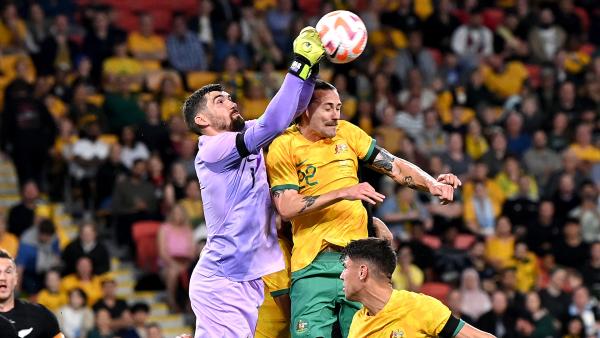
Mark Schwarzer
Mark Schwarzer is one of the most decorated players in Socceroos history, and one of the stars of Australia’s ‘Golden Generation’ that qualified for the 2006 FIFA World Cup in Germany. It was Schwarzer’s two saves in the penalty shoot-out that helped Australia defeat Uruguay and reach the FIFA World Cup Finals after a 32-year drought. The goalkeeper is the Socceroos’ most-capped player, making 109 appearances for his national team between his debut in 1993 to his international retirement 20 years later. A Premier League Stalwart, the shot-stopper made more than 500 appearances mainly with Middlesbrough and Fulham, and bit-part stints at the end of his career with Chelsea and Leicester. In 2021, Schwarzer was added to the Football Australia Hall of Fame.
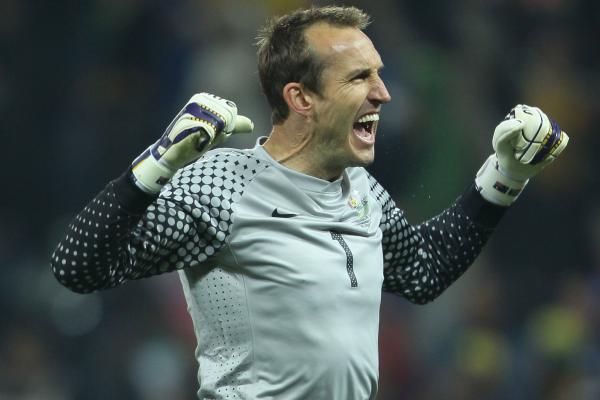
Defenders
Scott Chipperfield
Chipperfield was a driving force in the Wolves team that swept to back-to-back NSL titles in 2000 and 2001, and won the Oceania Club Championship in 2001. That club success and a growing international profile with the Socceroos earned Chipperfield a move to Swiss Super League club FC Basel. It was the start of a prodigious trophy haul for Chipperfield, who won seven league titles and six Swiss Cups with Basel. The then 29-year-old was a part of the famous victory over Uruguay in 2005, breaking the Socceroos’ 32-year World Cup hoodoo. He was selected to represent Australia at the 2006 FIFA World Cup in Germany and again at the 2010 FIFA World Cup in South Africa. In 2012, he was inducted in the Football Australia Hall of Fame. After the final group game against Serbia, which Australia won 2–1, Chipperfield announced his retirement from international football after 68 matches and 12 goals.
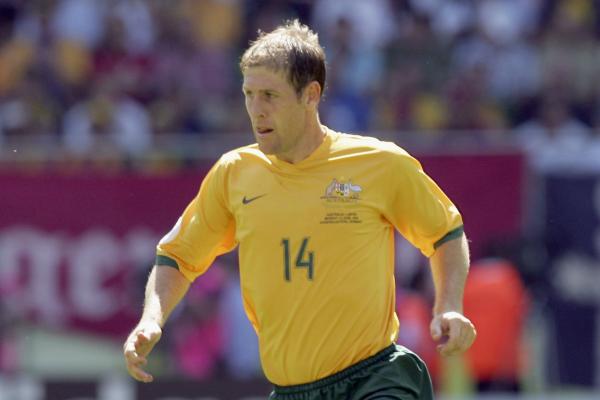
Joe Marston
Joe Marston was a strong and agile central defender in an illustrious career in Australia and England. He represented Australia and also coached the national team, but made his name with famous English club Preston North End. Marston was the first Australian to play in an English FA Cup Final when Preston North End went down to West Bromwich Albion in 1954. Among the many individual accolades bestowed upon Marston was was an MBE, the Australian Sports Medal and induction into the Football Australia Hall of Fame in 1999. The best player in the A-League Men’s Grand Final is awarded the Joe Marston Medal.
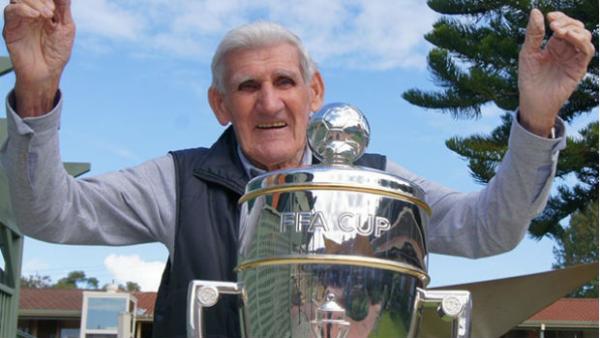
Craig Moore
Craig Moore holds a unique place in Australian football having represented his country at every under age level – under 17, under 19 and under 23 (Atlanta Olympic Games) – and two FIFA World Cup finals (Germany ‘06 and South Africa ‘10). In Europe he played for Glasgow Rangers, Crystal Palace, Borussia Mönchengladbach and Newcastle United, while in Australia he played for Queensland Roar (later renamed Brisbane Roar) in the A-League as their captain and marquee player for three seasons. The central defender was inducted into the Football Australia Hall of Fame in 2011.
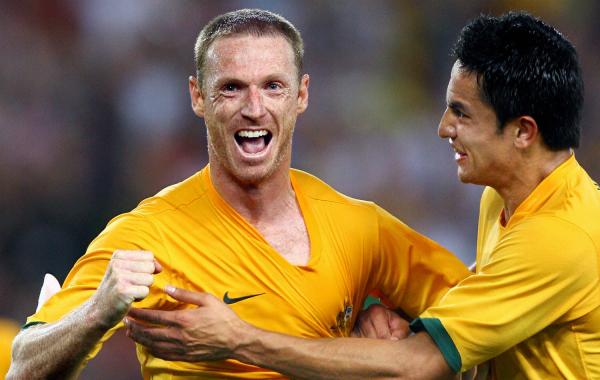
Lucas Neill
Lucas Neill captained Australia on 61 occasions, a record which still stands. He played a total of 96 matches between 1996 and 2013 and was involved in two FIFA World Cups in 2006 and 2010 and two AFC Asian Cups in 2007 and 2011. Neill spent most of his club football playing in England with Millwall, Blackburn Rovers and West Ham United.
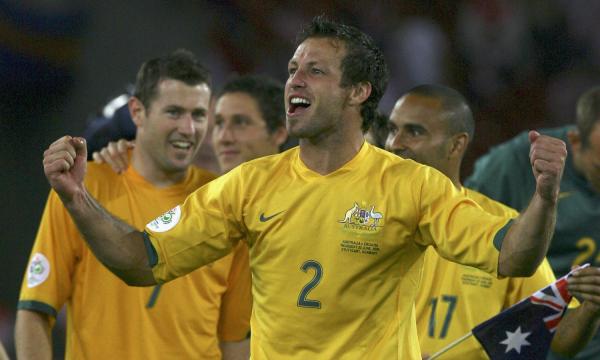
Alex Tobin
Alex Tobin amassed 522 appearances, most with Adelaide City before joining Parramatta Power and ending his playing career with Northern Spirit. He helped Adelaide City to three NSL titles and two Australian Cups, and made the most appearances for any player in Australian national domestic competition. Tobin gained 87 full 'A' caps for Australia and appeared for his country a total of 113 times. He captained the Socceroos from 1995 after Paul Wade retired and was subsequently inducted in the Football Australia Hall of Fame Class of 2007.
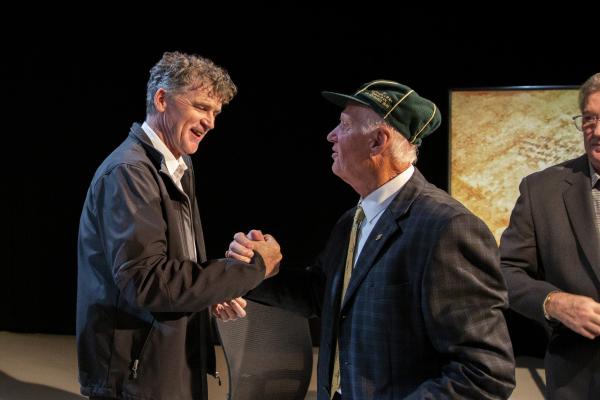
Tony Vidmar
A versatile defender who can play anywhere in the defensive line, Tony Vidmar was part of four World Cup qualifying campaigns He made 76 full 'A' internationals for the Subway Socceroos over a 15-year international career and scored a vital goal during the penalty shootout against Uruguay which put Australia into the World Cup. Vidmar represented some big clubs during his playing career, playing for the likes of NAC Breda (Netherlands), Rangers (Scotland), Middlesbrough (England), and Cardiff City (Wales), before returning to Australia to play for the Central Coast Mariners in the A-League. Since retiring from playing, Vidmar has moved into the coaching space, and is currently (as of 2019) an assistant coach to Graham Arnold with the Socceroos. In 2009 he was added to the Football Australia Hall of Fame.
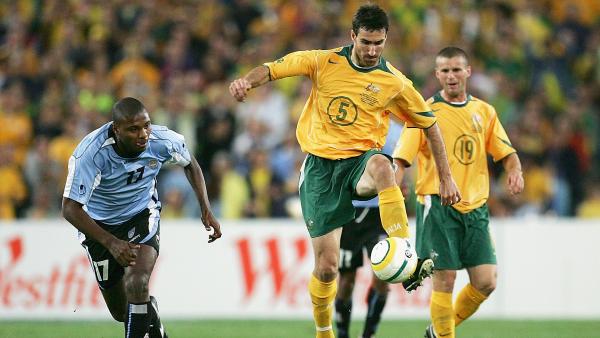
Peter Wilson
A 1999 inductee into the Football Australia Hall of Fame, Wilson was widely regarded as one of the toughest defenders in the modern era. He was a dominating figure in the Australia team during the 1970s. Between 1970-79, Wilson made a then record 115 appearances for the national team, and captained Australia from 1971, including the 1974 World Cup Finals.
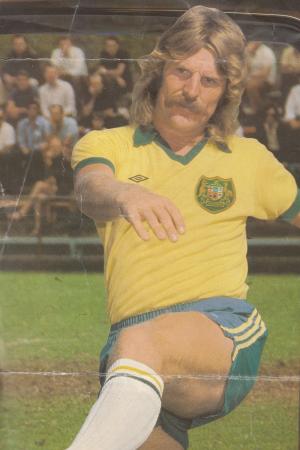
Midfielders
Mark Bresciano
Mark Bresciano was one of the midfield stars of Australia's 'Golden Generation' that qualified for the 2006 FIFA World Cup in Germany. It was his equalising goal against Uruguay in the final qualifying match that led to the dramatic and historic penalty shoot-out. In all he played 84 matches for Australia and was part of the squad which won the AFC Asian Cup 2015. During his club career, the creative midfielder spent the bulk of his time in Italy with Empoli, Parma and Palermo. In 2018 he was recognised for his tremendous career with a Football Australia Hall of Fame induction.
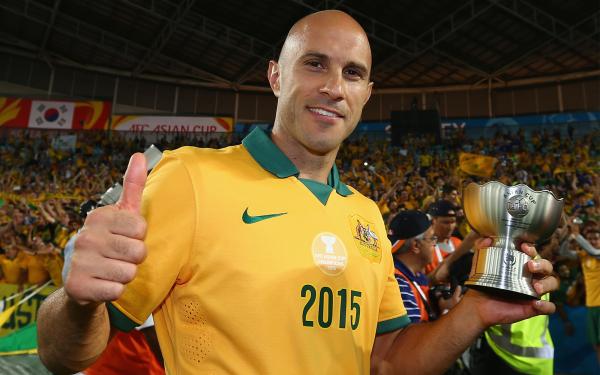
Brett Emerton
Brett Emerton was a dynamic player down Australia’s right flank as he could operate as a right-back or right midfielder. Four years with Sydney Olympic earned a move to Dutch giants Feyenoord before switching to Blackburn Rovers in 2003. In eight years with the Blue and Whites, he recorded almost 300 appearances. Emerton made his Subway Socceroos debut in 1998 and went on to feature at two FIFA World Cups and two AFC Asian Cups, all while amassing 95 caps and 20 goals.
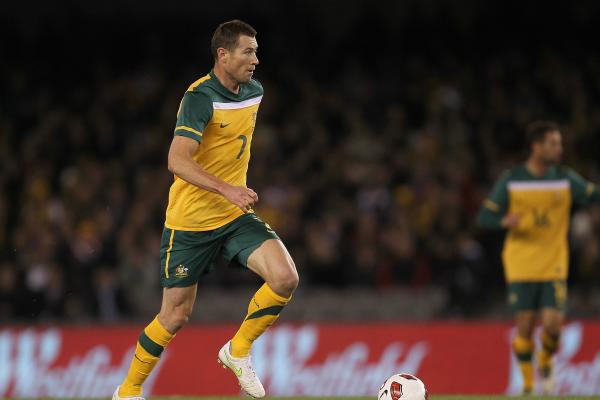
Mile Jedinak
One of Australia’s best defensive midfielders ever produced, Mile Jedinak captained his country at two FIFA World Cups in 2014 and 2018 as well as at the 2015 AFC Asian Cup which the Subway Socceroos won, and scored in each of these tournaments. Jedinak retired from international football in October 2018, registering 79 caps and 20 goals. At club level some of the clubs he played for include Central Coast Mariners, Crystal Palace and Aston Villa.
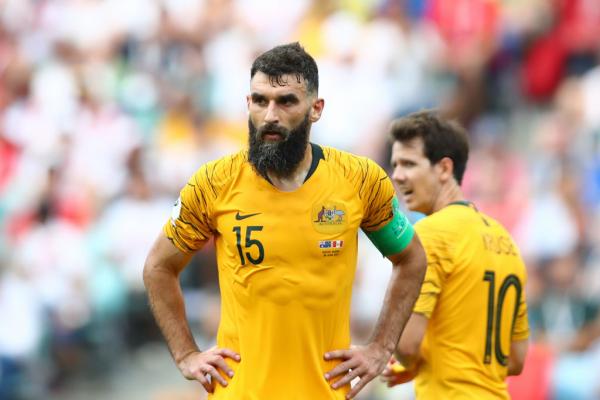
Harry Kewell
Harry Kewell overcame more than his fair share of injury struggles to represent Australia on 58 occasions, scoring 17 goals. The forward is considered one of Australia’s greatest players ever produced. Boasting a famous left boot, he played an instrumental role in memorable upsets over England, Holland, Germany and Uruguay (on a couple of famous occasions), all the while providing for his country when they needed him most at the Asian Cup and World Cup. In the club arena, Kewell’s notable overseas spells include Leeds United, Liverpool and Galatasaray. He was added to the Football Australia Hall of Fame in 2019.
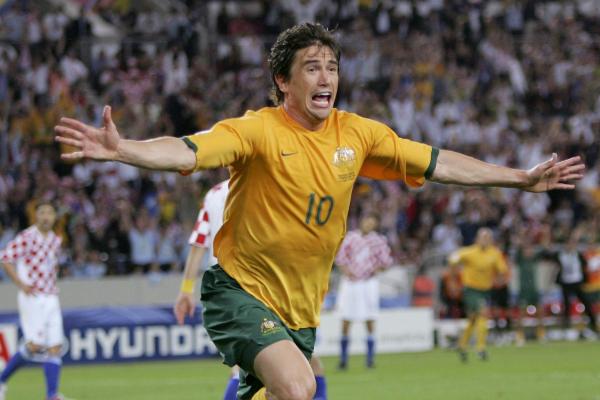
Aaron Mooy
Aaron Mooy currently has 53 caps and seven goals to his name for Australia. The creative midfielder is one of the best distributors in the team with his passing vision and range. Mooy appeared at the 2018 FIFA World Cup in Russia, playing 90 minutes in all three group matches. Mooy, who plays his club football with Celtic, has also played in England with Huddersfield Town and Brighton & Hove Albion.
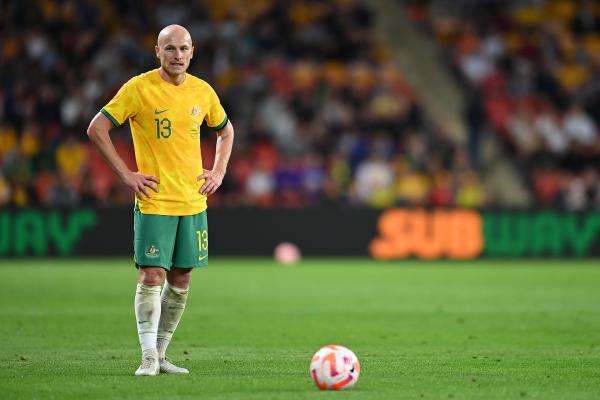
Johnny Warren
Having made his international debut in November of 1965 against Cambodia, Johnny Warren went on to make 42 appearances and scored six goals. In 1967, he captained the Socceroos for the first time against New Zealand and captained the side a total of 24 times. Warren was also part of the first ever Socceroos squad to go to a FIFA World Cup in 1974 in West Germany. In their opening match against East Germany, Warren & the Socceroos would earn themselves respect globally with a strong showing. His infectious passion for the game made him the face of the sport and the unofficial spokesperson for football and its long fight for mainstream acceptance. Warren’s commitment to the game at every stage of his career, has left a long-lasting legacy for football in Australia.
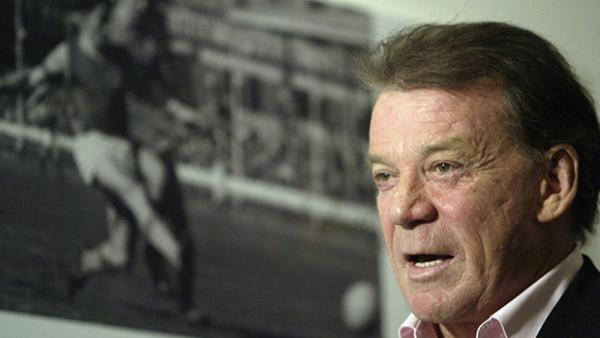
Forwards
John Aloisi
John Aloisi scored 27 goals in 55 matches for Australia between 1997 and 2008. The striker is best remembered for scoring the winning penalty in the shootout win over Uruguay in 2005 in Sydney – one of Australia’s most memorable sporting moments. During his club career he represented Standard Liege and Royal Antwerp in Belgium before moving to Cremonese in Italy’s topflight. In 1997 he moved to England and spent time with Portsmouth and Coventry City. In 2001 he signed for La Liga outfit Osasuna and later joined Alaves until returning to his homeland in 2007.
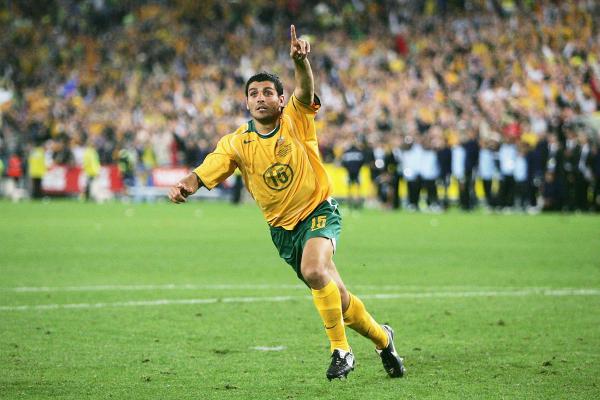
Tim Cahill
Australia's greatest goalscorer, Tim Cahill netted 50 goals in 108 caps between 2004 and 2018. Cahill was part of four FIFA World Cups, scoring five goals across three of the tournaments. Cahill built a reputation of being an aerial threat and popping up at key moments for his country such as his two goals against Japan in the opening game of Group F in 2006. He was also in the team that won the AFC Asian Cup in 2015. During his club career he best remembered for his time at Millwall and even more so with Everton where he spent eight years at Goodison Park.
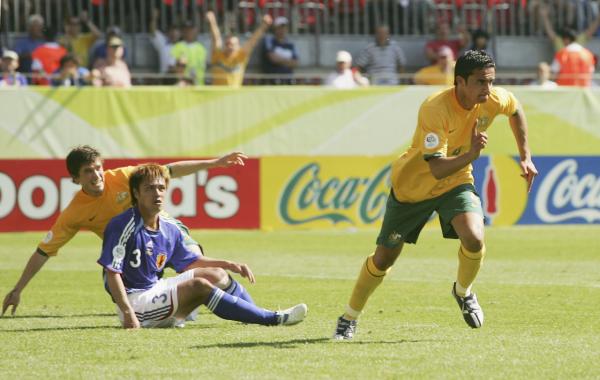
Reg Date
Newcastle native Reg Date is widely regarded as one of Australia’s great goal scorers. He represented Australia six times when international matches were few and far between. His most productive years were 1947, when he scored 72 goals in the season for Canterbury, and 1937 when he scored 204 goals for Plattsburgh Under-18s. Date was inducted into the Football Australia Hall of Fame in 1999.
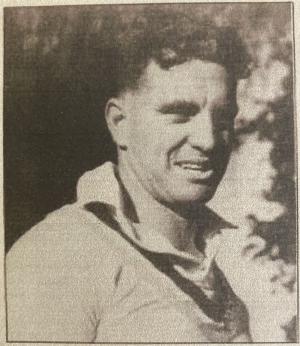
John Kosmina
John Kosmina’s career bloomed when he switched from Adelaide to the talented Sydney City in the National Soccer League – a move that led to national selection. He was one of the first Australians in the modern era to play professionally in England where he made a handful of appearances for Arsenal. Between 1976 and 1988, Kosmina scored 25 goals and won 60 caps, while captaining the Subway Socceroos in their appearance at the 1988 Seoul Olympic Games. In 1999, he was an inaugural inductee into the Football Australia Hall of Fame.
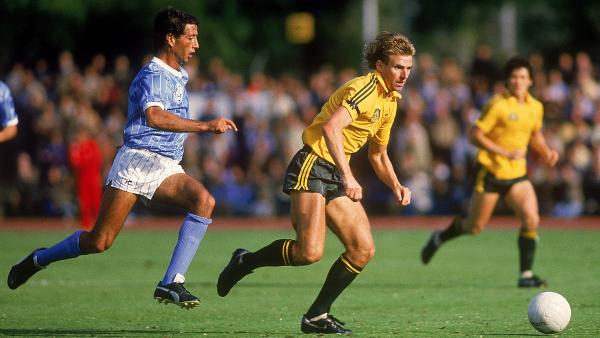
Judy Masters
James "Judy" Masters was born in Balgownie, Southern NSW in 1898. He played 22 times for the national team, including 13 full internationals, scoring 12 goals and captaining from 1923 to 1925. Known as the ‘Little Master’, he was recognised in his centre forward role as one of Australia’s best players before and during his time. Masters joined the army in World War One and led an AIF team formed in France in 1918. During a career spanning 400 club and representative games, Masters was never cautioned by a referee and in 1999 was part of the inaugural 1999 Football Australia Hall of Fame class.

Alf Quill
A prolific scorer, Quill’s 868 goals in senior games from 1927 to 1949 still stands as an Australian record.He made seven national appearances for eight goals and took up coaching after he retired. He was in charge of Australia in the match against Yugoslavia’s Hadjuk Split in late 1949. In 1999, Quill was inducted into the Football Australia Hall of Fame.
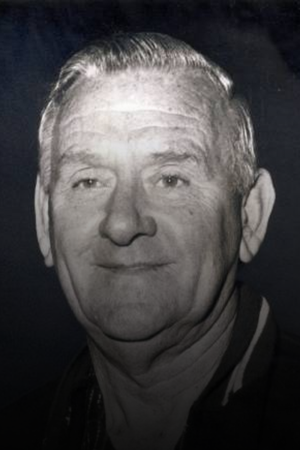
Mark Viduka
Born in Melbourne in 1975, Mark Viduka captained Australia at the 2006 FIFA World Cup in Germany which was the culmination of a career that began with Melbourne Knights and saw him ply his trade with Dinamo Zagreb, Celtic, Leeds United, Middlesbrough and Newcastle United. He was top scorer, player of the year and the young player of the year when the Knights won the National Soccer League in 1994/95. Viduka represented Australia at all levels and played 43 senior ‘A’ internationals for his country, scoring 11 goals and in 2014 was inducted into the Football Australia Hall of Fame.
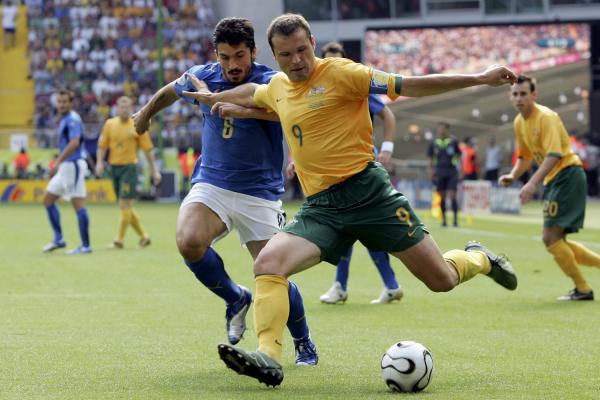
Your Subway Socceroos Team of the Century:
